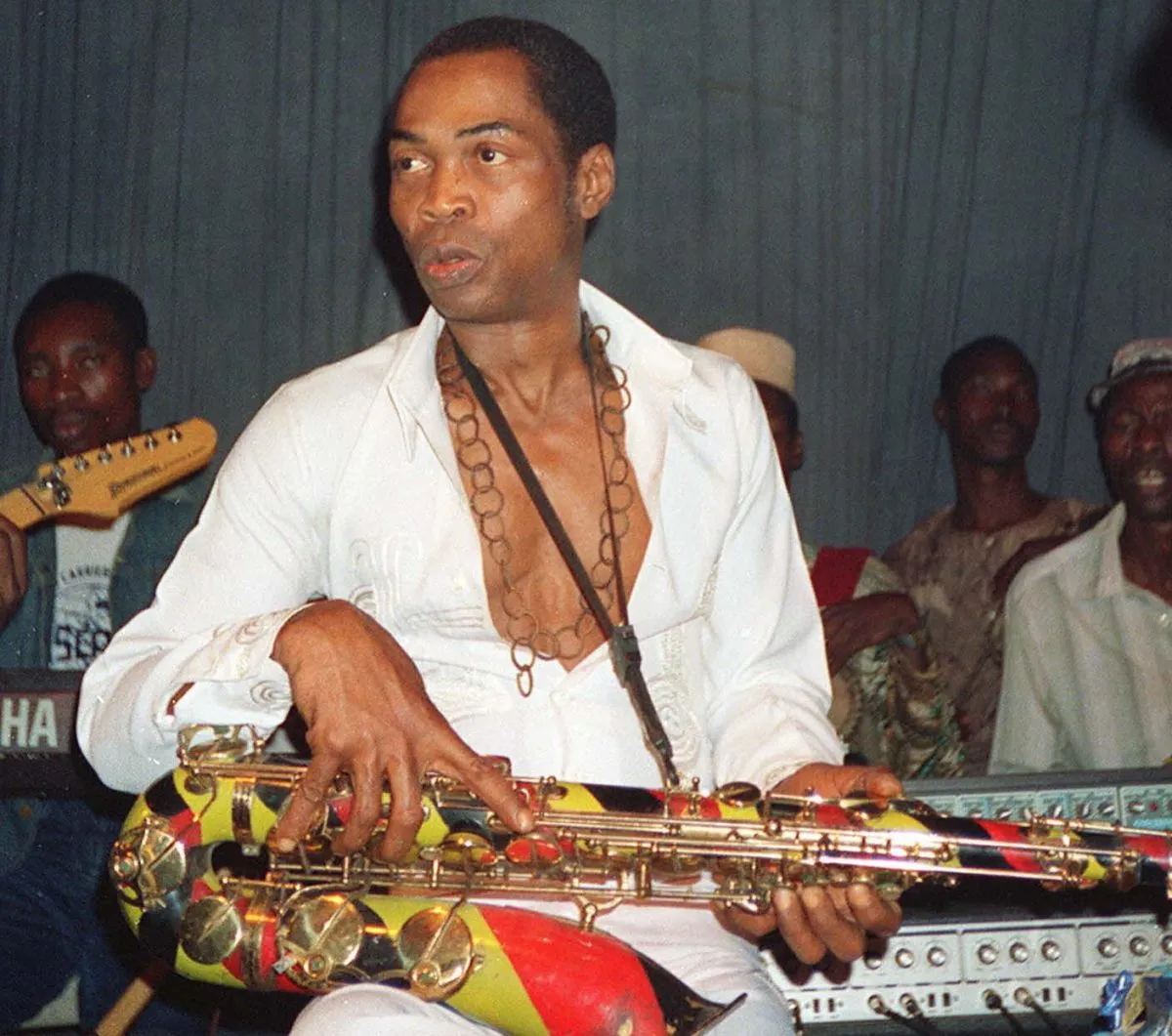Since Fela Kuti’s death in 1997 at the age of 58, his former manager Rikki Stein has devoted much of his energies to the musician’s legacy, managing his huge catalogue of recordings and being instrumental in bringing the hit-musical Fela to audiences across the US, Canada, the UK and Lagos.
Born into a middle-class Jewish home in London, Stein cut his teeth in the UK in the swinging ’60s, with artists such as The Jimi Hendrix Experience, The Kinks, The Animals, The Yardbirds, and The Moody Blues. He reminisces about time spent in Jimi Hendrix’s hotel room, recalling a revolving door of young ladies keen to spend time with the guitar wizard.
He switched from promoting performers with his business partner, Jean Vanloo, to bringing over bands from the UK to gigs in clubs in Belgium and northern France.
He then moved to the French capital. Arriving almost penniless in Paris after falling out with his business partner, he survived by walking across the city and living on “the two boiled eggs, toast and marmalade breakfast that came with my hotel room”.
However, proving the old adage that you can’t keep a good man down, Stein “walked in cold” to Barclay Records and with his undoubted chutzpa, and was soon employed as an directeur artistique.
His first task was to help Charles Aznavour record some songs in English, before recording the great Moroccan R&B singer, Vigon (who spoke not a word of English).
Meeting Fela
He recalls that he first became aware of Fela Kuti’s music when travelling with a group Afro-Caribbean dancers and musicians in the back of a van, one of whom put on a cassette tape of Fela’s Sorrow, Tears and Blood album. He describes his reaction as being “galvanised … gob-smacked”. He adds: ”It felt like Fela was talking directly to me.”
Last year he told the BBC: “The music spoke to me in a way I’d never encountered, exuding warmth, intimacy, excitement and a constant feeling of anticipation. Every word spoke directly to my inner being, vividly describing life under a totalitarian regime, but I saw clearly how the message could be applied to any country.”
Stein got involved with a rain-forest organisation, The EarthLife Foundation, and had hoped to stage a three-day festival featuring artists from all the world’s rainforest countries at Knebworth Park in the UK. Naturally, he wanted Fela both to join his board of advisors and perform.
But a key sponsor, the brewing giant Guinness, pulled out at the last minute.
Nevertheless, Stein approached Fela and went to meet him in London.
He recalls an extraordinary incident at Fela’s five-star hotel when, having completed his meeting, Fela walked Stein to the hotel lift dressed only in his swimming trunks.
Waiting at the lift were a couple in a ball-gown and tuxedo.
“You can imagine their reaction on seeing Fela wandering up the corridor barefoot, dressed only in his Speedos,” Stein notes. ‘Shock and awe’ comes to mind.
Lagos calling
The relationship between the two soon blossomed. When Stein first visited Lagos, he was to get a taste of Nigerian ways. He booked a flight from London to Lagos on Nigerian Airways, boarded the aircraft and an hour and a half later it still had not taken off. Requested to disembark, he and his fellow passengers were given a hotel room for the night, the flight taking off at lunchtime the next day.
He was met in Lagos by Fela himself and his posse and soon settled into Fela’s rhythm.
While Fela would sleep all day, Stein spent most of his days with Beko, Fela’s brother and a legendary activist and medical doctor.
Soon, Stein was to be initiated into red-hot goat stew and nightlong spliff-fuelled revelries, dancing the night away at Fela’s famous Shrine nightclub.
Work involved helping to organise shows for Fela at the National Stadium in Lagos. He even managed to extricate the band from jail. They had been arrested before the show by the ever-vigilant and money-hungry Nigerian police.
Stein writes of the challenges and frustrations of managing major talent.
“Immense quantities of patience are required while slogging through the creation of itineraries, contracts, technical riders, stage plans, marketing campagins and the minutiae of building and holding together the multi-layered infrastructure of an artist’s career. The tinient absent detail, a saxophone reed, a bass string, a broken drum pedal, a missing boarding pass, a missing bass player (!) are able to jeopardise a mammoth event.”
Proving his experience and worth, Fela suggested Stein join his manager Francis Kerekian as co-manager. Stein returned to London, arranging for Fela to appear at the Glastonbury Festival in the UK and at the Zenith in Paris, France, as well as on TV programmes in both countries. A US tour was due to follow, but a last minute hitch saw Fela imprisoned over a supposedly undeclared sum of money as he was flying out of Nigeria. Fela received a five-year sentence from a military court, eventually serving 20 months.
“With Fela locked up,” Stein writes, “needing something to do, I set up an agency, Force Nine Talent, and over the next couple of years bought into the UK a host of African artists.”
Those artists included Tabu Ley Rochereau; Souzy Kasseya; Segun Adewale; Sonny Okosun; and even the one artist who could stand next to Fela as an activist musician, Thomas Mapfumo. Mapfumo’s music had been inspired by the Zimbabwe ‘chimurenga’ uprising that would eventually rid the country of white supremacy. Later, Mapfumo became a fearless critic of Robert Mugabe, accusing him of betraying the revolution, and then went into exile in the US when threats towards his family became evident.
Fela’s legacy
Following Fela’s tragic death, the result of HIV/Aids, Stein helped to manage a legacy which amounted to dozens of albums and was among those to set up the Fela-inspired New Afrika Shrine club in Lagos, which he calls “the embodiment of Fela’s spirit” and where Fela’s son Femi often performs.
As well as the devastating illness, Stein believes that Fela’s career of standing up to authority ultimately contributed to his untimely demise.
“Fela died of one beating too many. His body was covered in scars and his mind and spirit had to cope with 200 arrests. The system can only take so much,” Stein told the BBC.
Fela’s death marked the end of one of the most productive relationships of Stein’s life. But his career in music was by no means over. He went on to manage Guinea’s Les Ballets Africains, a remarkable troupe of musicians and dancers that stage spell-binding performances of traditional West African music and movement.
Other African artists that Stein has worked with over the years include Algerian singer and activist Rachid Taha; Morocco’s Master Musicians of Joujouka; Guinea’s Les Ballets Africains; Thomas Mapfumo and The Blacks Unlimited; and, more recently, Bobi Wine, the courageous Ugandan singer and activist.
While Fela may be gone, it is clear that his legacy of musical innovation, activism and standing up to authority remains strong.
Moving Music
The Memoirs of Rikki Stein
£18.99 Wordville
ISBN: 978-1-7391030-9-5
Want to continue reading? Subscribe today.
You've read all your free articles for this month! Subscribe now to enjoy full access to our content.
Digital Monthly
£8.00 / month
Receive full unlimited access to our articles, opinions, podcasts and more.
Digital Yearly
£70.00 / year
Our best value offer - save £26 and gain access to all of our digital content for an entire year!

 Sign in with Google
Sign in with Google 



